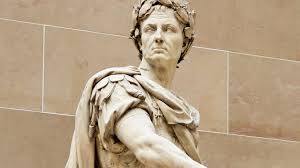Julius Caesar, a name echoing through the annals of history, is synonymous with power, ambition, and political intrigue. Born into a patrician family in 100 BC, Caesar rose to become one of the most influential figures in ancient Rome. His life, marked by military conquests, political maneuvering, and ultimately betrayal, continues to fascinate scholars and enthusiasts alike.
Caesar’s early years were characterized by ambition and determination. He quickly climbed the ranks of Roman politics, leveraging his family’s connections and his own charisma to gain influence. His military exploits in Gaul, where he famously declared “Veni, vidi, vici” (“I came, I saw, I conquered”), further solidified his reputation as a brilliant military commander.
However, Caesar’s political aspirations would lead to his downfall. His increasing power and popularity sparked jealousy and fear among his rivals in the Senate, ultimately culminating in a bitter power struggle. The crossing of the Rubicon in 49 BC, an act of defiance against the Senate’s authority, marked the beginning of a civil war that would see Caesar emerge victorious and establish himself as dictator of Rome.
As dictator, Caesar implemented a series of reforms aimed at addressing social and economic inequality, earning him both admiration and criticism. His assassination on the Ides of March in 44 BC, orchestrated by a group of senators led by Brutus and Cassius, marked the end of an era and plunged Rome into further turmoil.
Despite his death, Caesar’s legacy endured. His adopted heir, Octavian (later known as Augustus), would go on to establish the Roman Empire and rule as its first emperor. The Julian calendar, introduced by Caesar, remains the basis of the modern Gregorian calendar used worldwide. Additionally, his writings, including his famous Commentaries on the Gallic War, provide invaluable insights into the politics and military strategies of ancient Rome.
However, Caesar’s legacy is not without controversy. While revered as a military genius and a champion of the people by some, others view him as a ruthless tyrant who undermined the Roman Republic’s democratic institutions for his own gain.
In conclusion, Julius Caesar’s life is a testament to the complexities of power and ambition. His rise to prominence, military conquests, and untimely demise have left an indelible mark on history. Whether admired or vilified, Caesar’s legacy continues to captivate the imagination and spark debate centuries after his death.
newshub

